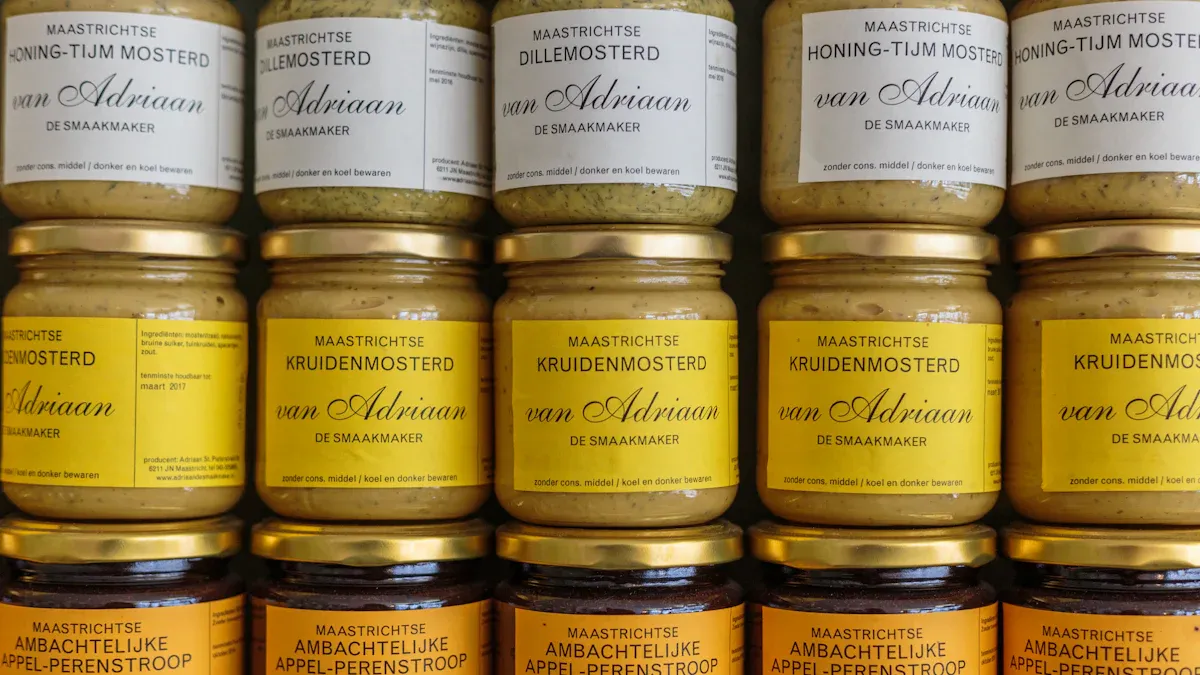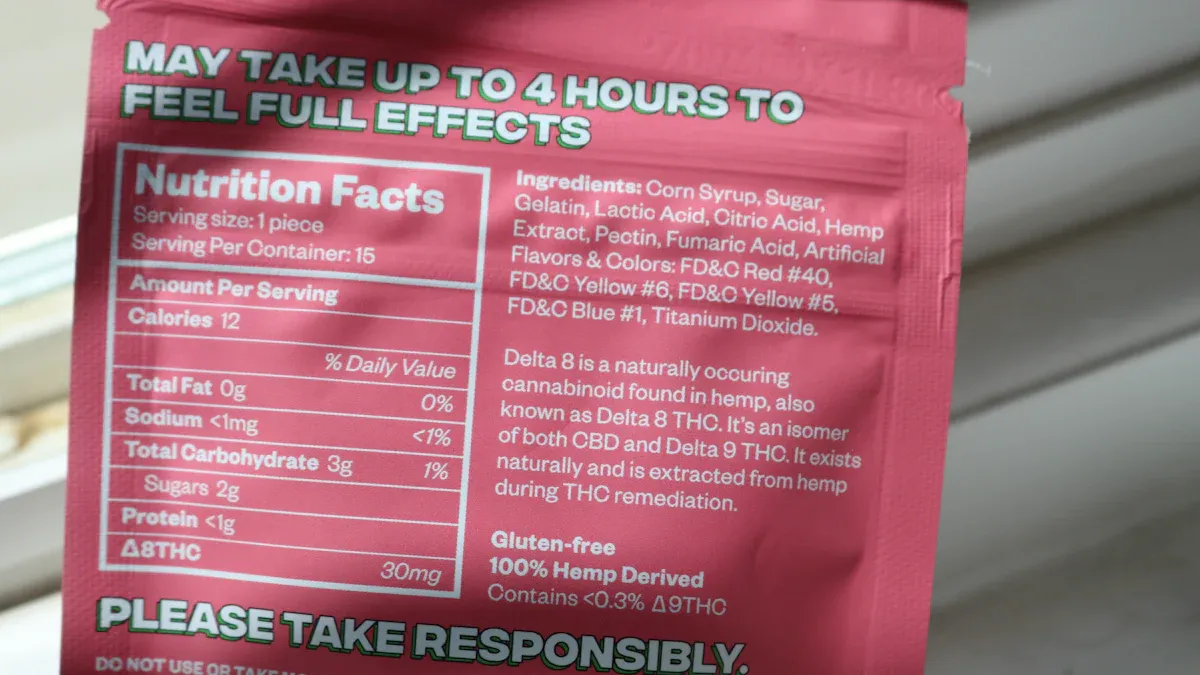Views: 0 Author: Site Editor Publish Time: 2025-10-01 Origin: Site












You can find food additives in many foods. They are in snacks, bread, and meals you can eat right away. About 60% of packaged foods have at least one worrying additive. Some, like potassium bromate and trans fat, can be bad for your health.
Stay away from potassium bromate, trans fat, and nitrates. These additives can cause big health problems like cancer and heart disease. - Always check food labels closely. Pick foods with short ingredient lists. Do not buy things with chemicals that are hard to say. - Try to eat whole foods when you can. Fresh fruits, vegetables, and lean meats usually have fewer bad additives.

Potassium bromate is used in some breads. It helps dough rise. You should not eat foods with this additive. Studies show it can cause cancer and other health issues. Many places, like the European Union, Canada, and China, do not allow potassium bromate in food. The International Agency for Research on Cancer says it might cause cancer in people.
Here is what scientists found:
Propyl paraben keeps processed foods fresh longer. You should be careful with this additive. Studies show it can mess with hormones and may be linked to breast cancer. Parabens act like estrogen. Scientists found parabens in breast tissue. If you eat it for a long time, it may help cancer cells grow and spread. Experts have not decided how much is safe to eat each day.
Propyl paraben can mess up your hormone system.
It may help breast cancer cells grow.
Eating it for a long time may raise cancer risk.
There is no safe daily amount set for people.
BHA keeps fats and oils from going bad. You should not eat foods with BHA. Studies link it to cancer, thyroid problems, and other health issues. The International Agency for Research on Cancer says BHA might cause cancer in people. The National Toxicology Program and California EPA also say BHA is risky.
Nitrates and nitrites are found in meats and cheeses. You should eat less of these additives. Studies show they can raise your risk of bowel, stomach, ovarian, and breast cancers. These additives keep food looking and tasting good. But they can make harmful chemicals in your body.
You can find them in deli meats, bacon, hot dogs, salami, sausages, and some cheeses.
Benzoic acid and benzoate help keep foods and drinks fresh. You should be careful with these additives. They can cause allergies, skin problems, and trouble with your body’s metabolism. Sometimes, they mix with vitamin C and make benzene, which can cause cancer.
Can cause allergies and skin rashes.
May upset your stomach and breathing.
Linked to more ADHD symptoms in kids.
May cause oxidative stress and swelling.
Experts say you can have 0–20 mg per kg of body weight each day. Some kids may eat more than this amount.
Sodium nitrite keeps meat looking fresh and stops it from spoiling. You should not eat foods with this additive. It can make nitrosamines, which can cause cancer. The International Agency for Research on Cancer says eating nitrite in some ways probably causes cancer in people. Eating a lot can also cause methemoglobinemia. This makes it hard for blood to carry oxygen, especially in babies.
Eating too many nitrites is dangerous and can cause serious health problems.
Trans fat is in some processed foods, baked goods, and fried foods. You should not eat trans fat. It raises your chance of heart disease, stroke, and clogged arteries. Even a small increase in trans fat can raise your heart risk by 23%. Trans fats raise bad cholesterol and are worse than saturated fats.
Linked to more heart disease and stroke.
Many places, like Singapore, Saudi Arabia, and Canada, do not allow trans fats in food.
The World Health Organization wants countries to limit trans fats to keep people healthy.
MSG makes food taste better. Most studies say MSG is safe for most people. Some people may get mild symptoms like headaches, sweating, or feeling sick if they eat a lot. Serious problems, like chest pain or trouble breathing, are rare and happen mostly to sensitive people.
Tartrazine is a yellow color used in drinks, snacks, and candy. You should not eat tartrazine if you have allergies or asthma. It can cause skin rashes, breathing problems, and may make kids more hyperactive. Studies show tartrazine may hurt DNA and could be linked to cancer if used for a long time.
Can cause allergies and asthma attacks.
May cause behavior problems and hyperactivity in kids.
May hurt DNA and raise cancer risk.
Less than 0.12% of people are sensitive to tartrazine, but kids are more at risk.
Carboxymethyl cellulose (CMC) makes processed foods feel better. You should eat less CMC. New studies show it can cause stomach pain, lower good gut bacteria, and make your digestive tract swell. CMC may raise your chance of getting bowel disease and other gut problems.
Experts set limits for CMC, but check labels and pick foods with fewer additives.
Polysorbates, like Polysorbate 80, help mix things in processed foods. You should not eat these additives if you have allergies or stomach problems. Polysorbates can cause skin rashes, stomach pain, and may mess up your gut bacteria. Some studies link them to bowel disease and metabolic problems.
May cause allergies and stomach issues.
Can break down the mucus layer in your gut.
May hurt good gut bacteria and confuse your immune system.
Erythritol is a sugar substitute in low-calorie and sugar-free foods. You should be careful with erythritol. New studies link high blood levels to more heart attacks and strokes. Erythritol makes platelets more likely to form clots, which can happen faster.
Eating foods with some additives can make you sick. These additives are linked to health problems that last a long time. You can get obesity, cancer, heart disease, or type 2 diabetes. Emulsifiers in processed foods can hurt your heart. Eating lots of ultra-processed foods makes obesity, cancer, and diabetes more common. These health problems can make life harder and need long-term care.
Some people have bad reactions to food additives. You might get a skin rash, trouble breathing, or stomach pain after eating them.
People can have food hypersensitivity when they eat foods with these additives. Most studies about hypersensitivity use small groups of people. Some reports are old and only look at a few cases.
Food hypersensitivity means your body reacts badly to food or additives. It can happen in two ways: immunologic or non-immunologic. Immunologic reactions are split into three types: IgE-mediated, non-IgE mediated, or both.
The American Academy of Allergy, Asthma and Immunology says some people react to additives. Most reports are about single people or small groups. Dyes and sulfites cause most of these reactions.
Kids are more sensitive to food additives than adults. Their bodies are smaller, and they eat more processed foods for their size. Eating additives early can cause health problems later. Kids can get chronic diseases as they grow up. Nitrites and nitrates can mess up hormones and hurt growing brains. Benzoates and artificial colors can cause allergies and behavior problems. Artificial sweeteners may lead to early puberty and weight gain. There are no clear safety limits for kids, and eating lots of processed foods can be risky.
Scientists are still learning about food additives and health. Mathilde Touvier found that ultra-processed foods with many additives are less healthy and have more toxins. These foods can raise your risk for cancer and heart disease. Artificial colors and preservatives can cause mental health problems. Eating lots of emulsifiers can lead to more heart disease. Some additives may cause cancer. Kids can have behavior problems and be more hyperactive. Allergic reactions like hives and asthma can happen.
Using food additives for a long time can cause cancer and mental health problems. Sodium benzoate and artificial colors may hurt the brain and change how kids act.

You can start by checking ingredient lists on packaged foods. Look for short lists with simple names you know. If you see a long list of chemicals, the food likely has many food additives. Some brands, like ZIO Chemical, supply additives such as acidity regulators, sweeteners, food thickeners, colorants, emulsifiers, and preservatives. When you see these names, you know the product contains extra ingredients. Reading labels helps you make better choices and avoid unwanted additives.
Whole foods are foods that have not been changed much from their natural state. You can pick fresh fruits, vegetables, and lean meats. These foods usually do not have extra additives. When you choose whole foods, you lower your risk of eating harmful chemicals.
Fresh fruits and vegetables
Lean meats and fish
Whole grains like brown rice and oats
Cooking at home gives you control over what goes into your meals. You can use fresh ingredients and avoid processed foods. Try simple recipes with basic spices and herbs. When you cook, you decide what goes into your food.
Smart shopping means planning before you buy. Make a list of healthy foods. Shop the outer aisles of the store, where you find fresh produce, dairy, and meats. Try organic products if you want to avoid synthetic additives.
Read labels before buying
Choose fresh or frozen foods
Avoid foods with long ingredient lists
You now know which food additives to avoid for better health. Watch out for potassium bromate, trans fat, nitrates, and others. Make smart choices by reading labels and picking whole foods.
Look at the ingredient list on the package. Watch for names like potassium bromate or trans fat. Pick foods with fewer strange additives. This helps you stay healthy.
Not every additive is bad for you. Some, like ones from ZIO Chemical, keep food fresh or make it feel better. Always check the label and learn about what you eat.
Yes, you can pick whole foods instead. Cooking at home is a good idea. Shopping carefully helps you avoid many additives.